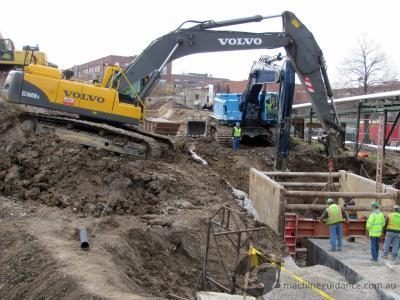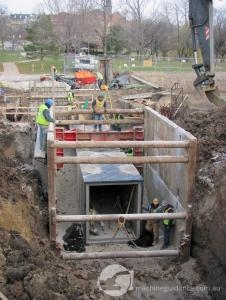Complex Trench Excavation
When charged with the challenge of relocating a complex, multi-layer steam tunnel Schneider Excavating Inc employed the use of GPS machine guidance to ensure that the trenches and grades were excavated precisely to plan, all within the project's tight confines.
Published: May 2013
Author: Jack Lucic

1
Think of Russian nesting dolls and you'll have an idea of the construction challenge that faced Schneider Excavating, Inc., Lannon, Wis., when they worked on a steam tunnel relocation project on the Clement Zablocki VA Medical Center grounds in Milwaukee, Wis. Unlike shelf-size Russian matryoshka dolls, the proportions were massive on this project. The steam system is within a concrete tunnel, which was within a temporary trench-shield box, which is all located underground.
A steam power plant on the grounds provides heat and hot water to the various buildings on the 125-acre CZVA Medical Center campus. C3T Construction Company, Milwaukee, Wis., the general contractor on the steam tunnel project, completed the project within three months.
"We were working in a tight space - a 50-foot (15.2m) corridor - next to the construction of a new spinal cord injury treatment facility," states Ron "Slim" Lange, project manager with Schneider Excavating. "Our task was to install a 600-foot (183m) section of new steam tunnel within a relatively tight schedule."
The 2.4 metre, 23,000 pound, steam-tunnel sections were placed on grade in a 8 metre deep trench. The bottom required precise grading before 150mm of #1 clear ¾-inch chip limestone (dolomite) rock was added. The excavation and achieving grade was a challenge.
Schneider Excavating partnered with D. F. Tomasini Contractors, Sussex, Wis. to help with the excavating, D. F. Tomasini is a large water and sewer main contractor. "Because we were operating in tight confines, we weren't able to dig with the excavator facing forward," Lange says." We had to dig reaching over to the side."
Schneider Excavating used two large machines - a Cat 385C L and a Volvo EC460B - both crawler hydraulic excavators equipped with Topcon GPS 3Dxi systems supported by a Topcon HiPer Lite base station.

2
"The Topcon systems allowed us to excavate precisely to the plan and ensured that we used the correct amount of the expensive rock," Lange says. "The GPS systems on the excavators saved us at least 25 percent of the production time while allowing us to be in control at all times." Interestingly, the D. F. Tomasini excavator operator had his first experience working with the Topcon system on this job. According to Lange, the operator couldn't believe how accurately he was able to dig.
A triple-stack system of huge trench shields was positioned in the excavated trench before the precast concrete steam tunnels were placed. The trench shields measure 7.3m long and have a 200mm baffled thickness. The triple stack included two 2.4m tall sections topped with a 1.2m tall panel. The bell-and-spigot joints on the panels were coated with rubberized mastic waterproofing. There were roughly 70 sections that had to be installed and 70 joints that had to be sealed. In addition to a coating of waterproofing which was applied before the shields were delivered to the site, 9.5mm protection board was installed inside the shield to protect the waterproofing surface. One foot over the top of the tunnel was filled with #1 stone, ¾-inch chips.
When the trench shields were in position, the Cat excavator lowered each of the 2.4m, 23,000 pounds sections of steam tunnel in place. The rectangular-shaped precast concrete sections measured approximately 2.1 by 2.6 metres.
"One of our biggest challenges was bringing in the steam tunnel sections onto the site precisely when we needed them," says Lange. "The sheer logistics of receiving shipments and maneuvering each of them into place required planning and tight execution."
With all projects, there are surprises. "One particular challenge we faced was a steam-tunnel section that needed to run under an existing Milwaukee Metropolitan Sewerage District (MMSD) service line," states Lange. "The MMSD couldn't tolerate more than a quarter-inch (6.35mm) of movement of the line when working near it."
Schneider needed to install two 15m sections of steel H-beams to support the MMSD line before carefully maneuvering a section of the steam tunnel underneath it. The process took four days to complete.

3
The steam tunnel was built with two low-points to facilitate flow and to provide access points to the 1.8m wide by 2.1m high tunnel interior. The steam tunnel pitch was one-half percent. The new sections were successfully connected to the existing steam tunnel sections to provide the seamless fit that C3T Construction was expecting.
Even during the typical cold, occasionally snowy, Wisconsin winter, Schneider was able to keep the project on schedule and ensure that joint mastic and tunnel sealants were applied at proper temperatures.
"Being able to work from a digital 3D model that was available to my management, me, and my machine operators was invaluable in terms of productivity, communication, precision, and eliminating rework," Lange concludes. "This complex project would have been a nightmare without the machine guidance technology. Additionally, with the technology we never needed workers in any unprotected job site areas, which is consistent with our corporate priority on safety. Schneider Excavating's owner was adamant that no one would get hurt on this job, and no one did."
In the end, all the pieces of this giant-size matryoshka doll project came together as designed.

Credit
Based in Chicago, Jack Lucic is a freelance writer covering construction, management, and insurance topics. He can be reached at jacklucic@yahoo.com.

Return to Articles


